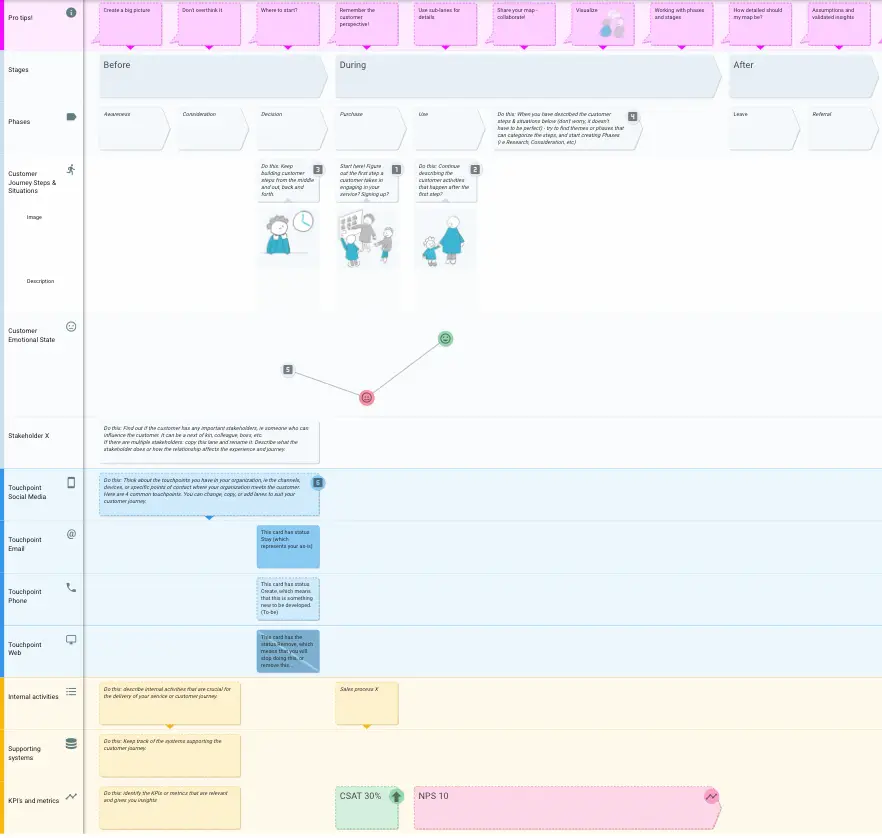Creating a customer journey map that delivers value and makes impact in your organization can take quite an effort. To help you save time, focus on the right things, and to avoid common mistakes and pitfalls, we created this professional journey map template.
Explore the template in the app
About the professional journey map template
This template works for most industries and organizations and will enable you to quickly get valuable and actionable customer insights.
This is not a pre-filled template for a specific industry. Instead, you will build your own map while we will guide you. Look inside the map, where you find pro-tips and answers to the most common questions. Follow the steps 1-6 to create a professional journey map that suits your organization and customers or users.
How to use this template
This template is made to help you save time and focus on the things that matters. Note that you can delete elements in the template that you don’t need (for instance the instructions or tips when you are finished). Just follow the instructions in step 1 – 6 in the map, and you are on the right track to a customized professional journey map that will work for you:
Step 1 to 3 – Customer journey
Where to start? Trying to figure out the starting point of a customer journey can sometimes be tricky. We recommend you to start in the during phase, and then work your way back and forth from there as you map the journey.
Step 4 – Phases
The phases can be your customer lifecycle adapted to your industry, scope or customer journey. In health care for instance, “Getting admitted” may be more relevant than “Purchase” which suits the retail industry better.
Step 5 – Emotional curve
In the emotional curve, describe the pain or gain points your customer is experiencing. To capture emotions easier, ask yourself what the customer is doing, thinking and feeling.
Insights can be based on either assumptions or research. This matters, and that’s why we recommend you to take notewhether an insight is validated or not. You may also want to upload a piece of field research or data in the map.
Step 6 – Touchpoints
Think about the touchpoints you have in your organization, ie the channels, devices, or specific points of contacts where your organization meets the customer. Here are four common touchpoints: social media, email, phone, website. You can change, copy, or add lanes to suit your customer journey.
Connecting the customer journey with your backstage
When you are finished mapping your customer journey by following the steps in this professional journey map template, congrats! You have now completed the customer journey part of your map.
Depending on the purpose of your journey mapping, you can now take some different steps. If you stop where you are, you can use the journey map to:
- Analyze and iterate your research in order to establish validated insights. Customer journey mapping is an ongoing activity and the map is probably never a finished product. It needs continuous work!
- Innovate and develop your product, service or business model. Use the journey map to understand what areas are important for the customer, and why these areas need to change or be removed. Use the map to get coherence in your organization – unite departments in focusing on creating the best customer experience!
- Follow up with KPIs and metrics that support your business goals, and the customer experience.
If your goal is to create customer journey based development or change, you will need to connect the customer journey to your backstage, the processes, departments and workflows on the inside of your organization.
To do so, use the backstage lanes in this professional journey map template (orange color), Internal activities, Supporting systems and KPIs and metrics.
Explore all our customer journey templates here and if you want ot learn more about how to create a customer journey map, check out our step-by-step guide.



